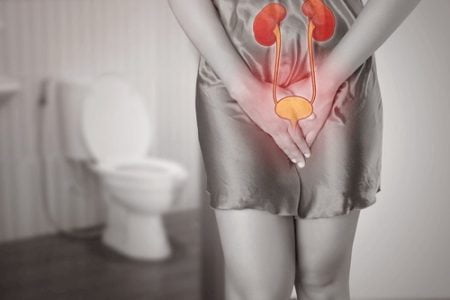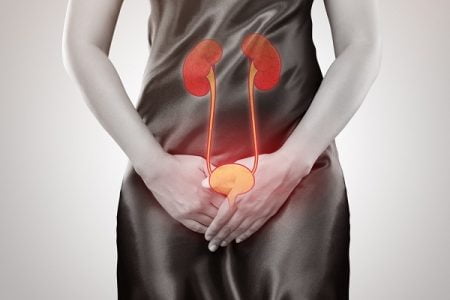Phenazopyridine (Azo) for Urinary Infections: Usage and Side Effects
- Updated on: Jul 13, 2024
- 4 min Read
- Published on Apr 22, 2021


What is Azo UTI?
Azo is a medicine that is used to relieve symptoms of urinary tract infection (UTI) such as irritation in the urinary tract, pain, burning, and the feeling to urinate frequently. The generic name for this medicine is phenazopyridine. Azo is the brand name for phenazopyridine hydrochloride.
It is also available under other names such as Uristat and Pyridium. Azo acts as an analgesic or painkiller within the urinary tract and soothes the urinary tract. It is commonly recommended for individuals with urinary pain such as from a urinary tract infection (UTI) etc.
Do Azo pills cure UTI? Is azo good for a urinary tract infection?
The drug does not treat the cause of the symptoms. It can only help relieve them while you take other treatments that take some time to work.
See also: Causes of Urinary Tract Infection (UTI)
See also: Diagnosis and Tests for Urinary Tract Infection
How do Azo pills work?
Azo (Phenazopyridine) is a dye that acts as a painkiller. The active ingredient in this drug are quickly processed by the kidneys and then expelled with the urine.
If you are suffering with UTI, it can help provide relief in pain by soothing the lining of the urinary tract. However, the exact mechanism of Azo is not yet known.
Azo does not fight the infection and therefore cannot treat the cause of urinary tract irritation and pain, but it can help ease the symptoms of infection or other types of urinary irritation. It is useful for urinary discomfort due to an infection, but will not cure the infection.
How is Azo taken? How often do you take AZO for UTI?
A standard Azo version is available as 95 mg pill. Higher-strength (maximum-strength) version is also available as 97.5 mg pill. The dose constitutes two pills up to three times a day. Azo dosage is based on your medical condition and response to the medication.
Prescription phenazopyridine is available in 200 mg pills, and it is generally taken one pill at a time. Doctors often recommend that a patient take Azo for the first two days of antibiotic treatment to relieve the pain and irritation while the antibiotic takes its effect to cure the actual cause that is urinary tract infection or any other infection. Doctors caution against taking Azo for more than two days as it can cause more serious problems.
See also: Treatment of Urinary Tract Infection (UTI)
How to use Azo tablets?
You can take this medication by mouth, usually 3 times daily after meals or as directed by the doctor. If you are taking this medication along with antibiotics for urinary tract infection, it is cautioned not to take it for more than 2 days without talking to your doctor.
Azo urinary pain relief: What conditions does Azo treat?
- Difficult or Painful Urination – – Azo provides urinary pain relief
- Urinary Tract Irritation
Side effects of Azo
You can experience the following side effects as a result of taking Azo for UTI or for any other medical condition:
- Headache
- Dizziness
- Stomach problems
Most people using this drug do not experience serious side effects. But some people may have serious problems such as:
- dark urine
- fever or chills
- bruising/bleeding
- weakness
- shortness of breath
- fast heartbeat
- seizures
- kidney problems
- change in the amount of urine
- bloody urine (hematuria)
- stomach/abdominal pain
- yellowing of skin
- yellowing of eyes
- vomiting or nausea
- serious allergic reactions such as – rashes, itching, dizziness, breathing problems, swelling on face, throat or tongue
Tell your doctor immediately if you experience any of these serious side effects, though they occur rarely.
Azo UTI precautions: Precautions before taking Azo tablets
You should tell your doctor if you are allergic to the drug before taking it. This product may contain certain ingredients which can cause allergic reactions or other problems. You can talk to your doctor or pharmacist for more details.
Azo is not recommended in certain conditions such as:
- kidney disease
- liver disease
- blood disorders such as hemolytic anemia
Precautions you should take before taking Azo tablets:
- Tell your doctor if you have a medical history of any of these diseases or medical conditions.
- Do not drive nor do anything that needs alertness as the drug may make you dizzy. Do not consume alcoholic beverages when you are taking the medicines.
- Azo can dye your urine and tears and change their colors. This may cause staining on the clothing and contact lenses. It is better to not wear contact lenses while you are taking this medication. This will become normal after you stop the medicine.
- Tell your doctor if you are pregnant or plan to become pregnant before using the drug.
- Tell your doctor if you are breastfeeding. However, it is not yet known whether the effect of this drug can be passed into the milk. But it is better to take necessary precautions and talk to the doctor before taking it.
FAQs
Can I use Phenazopyridine (Azo) for all types of urinary infections?
Phenazopyridine is primarily effective for relieving urinary pain and discomfort. However, it does not treat the underlying infection. Consult your doctor to determine its suitability for your specific condition.
How quickly does Phenazopyridine work for urinary pain?
Phenazopyridine provides rapid relief, usually within 30 minutes. Remember to follow your doctor's dosage instructions and complete the full course for optimal results.
Are there any potential side effects of Phenazopyridine?
While generally safe, Phenazopyridine may cause harmless discoloration of urine. However, severe side effects are rare. If you experience any unusual symptoms, seek medical attention promptly.
Can I take Phenazopyridine with other medications?
It's essential to inform your doctor about all medications you're taking. Phenazopyridine may interact with certain drugs, and your doctor can provide guidance on safe usage.
Is Phenazopyridine safe during pregnancy?
Pregnant women should consult their healthcare provider before using Phenazopyridine. While it's generally safe, individual circumstances may vary, and professional advice is crucial.












